by Michelle L. Price

In this Wednesday, Jan. 15, 2020, photo scientist and study director Jennifer Molignano uses an electronic pipette to prepare culture medium, a dark pink fluid that provides nutrition to living human skin tissue, as she sets up a demonstration of experiments at a MatTek Corporation lab, in Ashland, Mass. Molignano demonstrated experiments created to evaluate the effects of exposing living human skin tissues to commercially available skin care products, as well as an experiment to evaluate the effects of ultraviolet B rays, a simulation of exposing skin tissues to sunlight. (AP Photo/Steven Senne)
A growing number of U.S. states are considering a ban on the sale or import of cosmetics that have been tested on animals, as advocates argue testing products such as lotions, shampoos and makeup on rabbits, mice and rats is cruel and outdated.
The cause has gained support from consumers and many cosmetics companies, but the biggest hurdle is China, which requires that cosmetics sold in its large, lucrative market undergo testing on animals.
California, Nevada and Illinois all saw new laws take effect this year that ban the sale or import of animal-tested cosmetics.
The laws, which apply to tests performed after Jan. 1, aren't expected to cause much disruption for the industry because many companies already use non-animal testing. Instead, they draw a line in the sand that puts pressure on the U.S. government to pass a nationwide ban and help end China's requirement that most cosmetics sold in that nation of more than 1.4 billion people undergo testing on animals by Chinese regulators.
China's policy applies to all imported cosmetics, including makeup, perfume and hair care products, along with some "special use" goods produced in China, such as hair dye, sunscreen and whitening products that make functional claims.
Animal-tested cosmetics already are banned in Europe, India and elsewhere. A ban in the United States, one of the world's largest economies, would put further global pressure on China to end its policy and push Chinese cosmetics companies to rely on non-animal tests if they want to sell their products in the U.S.

In this Wednesday, Jan. 15, 2020, photo, scientist and study director Jennifer Molignano transfers a sample of living human skin tissue, grown on a porous membrane inside a plastic insert, to a culture plate with fresh medium, a dark pink solution that provides nutrition to the tissue, while demonstrating an experiment created to evaluate the effects of exposing human skin to commercially available skin care products, at a MatTek Corporation lab, in Ashland, Mass. (AP Photo/Steven Senne)
"We're not trying to create an island out here in Nevada," said state Sen. Melanie Scheible, who sponsored Nevada's law. "We are trying to join a group of other communities that have stood up and said, 'We don't support animal testing.'"
Animal-rights groups like Cruelty Free International and the Humane Society of the United States hope to get more states to pass bans this year.
Legislation has been introduced or will soon be made public in Hawaii, Maryland, New Jersey, New York and Virginia, according to Cruelty Free International, and a national ban has been introduced in Congress since 2014, though the bipartisan measure has been slow to advance. The most recent version introduced in November marks the first time the country's leading cosmetics trade group, the Personal Care Products Council, has become a vocal backer of the ban, support that should ease lawmaker concerns about business opposition.

In this Wednesday, Jan. 15, 2020, photo, scientist and study director Jennifer Molignano pipettes a sample of commercially available skin care product onto the surface of living human skin tissues while demonstrating an experiment created to evaluate the effects of exposing the product to skin tissues, at a MatTek Corporation lab, in Ashland, Mass. MatTek is a tissue engineering company that performs non-animal testing on cosmetics, skin care products and pharmaceuticals. (AP Photo/Steven Senne)
The California, Nevada and Illinois laws create exemptions for any cosmetics that were tested on animals to comply with regulations of a foreign government—an exception that acknowledges the reality that most companies will see their products tested on animals if they sell in China.
China is a "big complicating factor," said Monica Engebretson, who leads public affairs for Cruelty Free International in North America. "That's put companies that want to enter that Chinese market in a real bind."
Scheible said her aim in Nevada was not to punish those multinational corporations but to raise awareness and put pressure on other governments, like China, to act.
"A lot of people thought that we no longer tested on animals at all," she said. "They thought that this was already a thing of the past."
The bans in all three states require cosmetics sellers to use non-animal tests to prove their products are safe. Many international companies are already doing that after the European Union passed a series of similar bans on animal testing, culminating with a 2013 ban on the sale of animal-tested products.

In this Wednesday, Jan. 15, 2020, photo, scientist and study director Jennifer Molignano uses an electronic pipette to prepare culture medium, a dark pink fluid that provides nutrition to living human skin tissue, as she sets up a demonstration of experiments at a MatTek Corporation lab, in Ashland, Mass. (AP Photo/Steven Senne)
Supporters note that science has advanced, allowing companies in most cases to use non-animal alternatives—such as human cell cultures or lab-grown human skin and eye tissue—to test whether a product or ingredient is safe.
For example, EpiDerm, a synthetic skin tissue made by Massachusetts-based MatTek Corp., is created from cells taken from skin donated during procedures such as breast reduction surgery, circumcision and tummy tuck procedures.
Products can be applied to synthetic tissue to determine whether they cause skin irritation, damage, sensitivity or other issues. That can be used in place of a testing a product on the back of a shaved rabbit, animal rights supporters say.
Some of the biggest names in personal care and beauty, including Avon, Unilever and Procter & Gamble, have used MatTek's tissues for testing.

In this Wednesday, Jan. 15, 2020, photo, scientist and study director Jennifer Molignano notates the time she begins dosing living human skin tissues with two types of commercially available skin care products during a demonstration of experiments at a MatTek Corporation lab, in Ashland, Mass. MatTek is a tissue engineering company that performs non-animal testing on cosmetics, skin care products and pharmaceuticals. (AP Photo/Steven Senne)
Carl Westmoreland, a safety scientist with Unilever, said the European Union ban drove more innovation in non-animal testing. Companies like Unilever, trade groups and advocates are among those working with Chinese regulators and scientists to push for new rules, helping to familiarize them with procedures and results from non-animal tests.
"They have been changing and are continuing to change," he said, noting China in recent years has allowed some cosmetics produced within the country to avoid animal testing.
Francine Lamoriello, executive vice president for global strategies at the Personal Care Products Council said it's a slow process, but Chinese regulators are working to accept non-animal tests.
"They're having conferences. They really seem to be quite motivated to do as best as they can to accept and validate certain methods," she said.
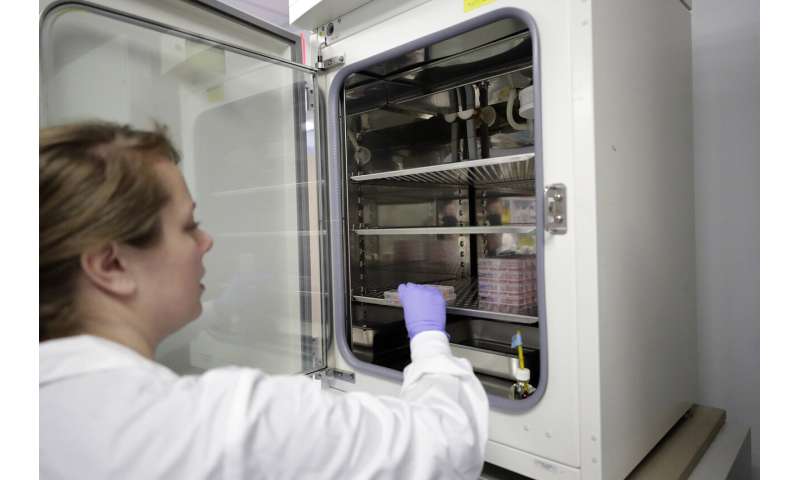
In this Wednesday, Jan. 15, 2020, photo, scientist and study director Jennifer Molignano places living human skin tissue samples into a 98.6 degrees Fahrenheit incubator during a demonstration of experiments on the tissues at a MatTek Corporation lab, in Ashland, Mass. Molignano demonstrated the experiments created to evaluate the effects of exposing human skin tissue to commercially available skin care products, as well as exposing the tissues to ultraviolet B rays, a simulation of exposing skin tissues to sunlight. (AP Photo/Steven Senne)
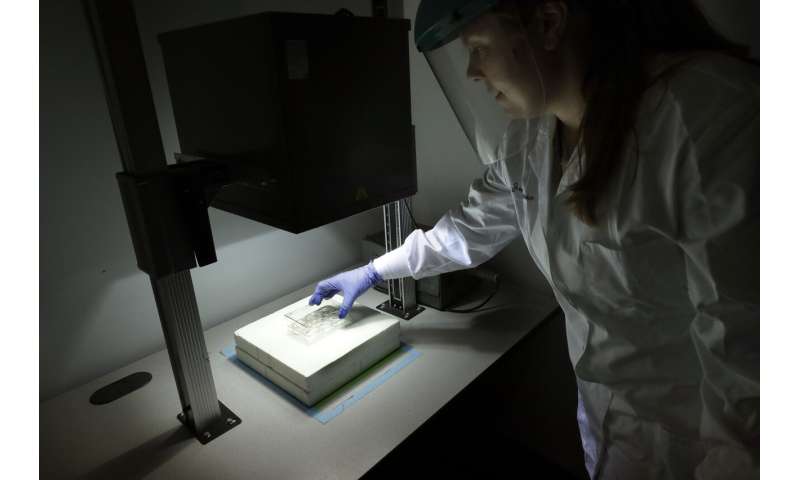
In this Wednesday, Jan. 15, 2020, photo, scientist and study director Jennifer Molignano places living human skin tissues under a solar simulator machine that emits ultraviolet B rays, while demonstrating an experiment created to simulate the exposure of human skin to sunlight, at a MatTek Corporation lab, in Ashland, Mass. MatTek is a tissue engineering company that performs non-animal testing on cosmetics, skin care products and pharmaceuticals. (AP Photo/Steven Senne)
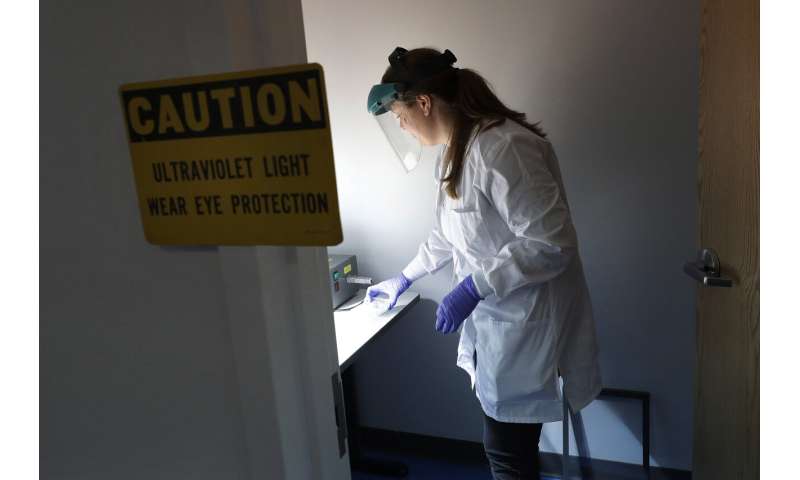
In this Wednesday, Jan. 15, 2020, photo, scientist and study director Jennifer Molignano places living human skin tissues under a solar simulator machine that emits ultraviolet B rays, while demonstrating an experiment created to simulate the exposure of human skin tissue to sunlight, at a MatTek Corporation lab, in Ashland, Mass. MatTek is a tissue engineering company that performs non-animal testing on cosmetics, skin care products and pharmaceuticals. (AP Photo/Steven Senne)
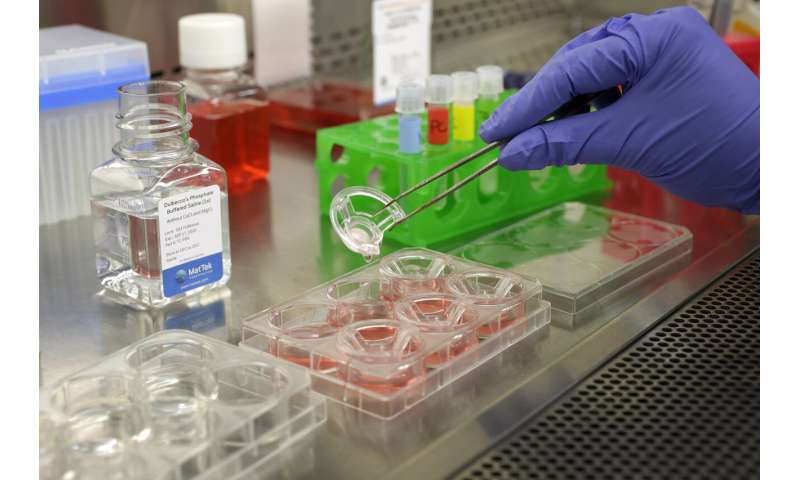
In this Wednesday, Jan. 15, 2020, photo, scientist and study director Jennifer Molignano uses forceps to transfer living human skin tissue to plates with saline solution, below left, in preparation for ultraviolet B exposure, while demonstrating an experiment created to evaluate the effects on skin of ultraviolet B rays, a simulation of skin tissue exposure to sunlight, at a MatTek Corporation lab, in Ashland, Mass. (AP Photo/Steven Senne)
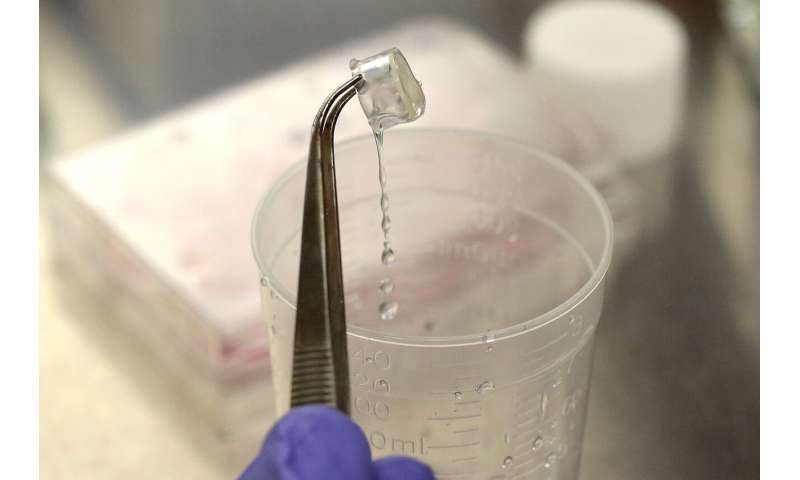
In this Wednesday, Jan. 15, 2020, photo, scientist and study director Jennifer Molignano uses forceps to hold a sample of living human skin tissue, grown on a porous membrane inside a plastic insert, while using saline solution to wash a skin care product off the tissue, during a demonstration of an experiment created to evaluate the effects of commercially available skin care products on human skin, at a MatTek Corporation lab, in Ashland, Mass. MatTek is a tissue engineering company that performs non-animal testing on cosmetics, skin care products and pharmaceuticals. (AP Photo/Steven Senne)
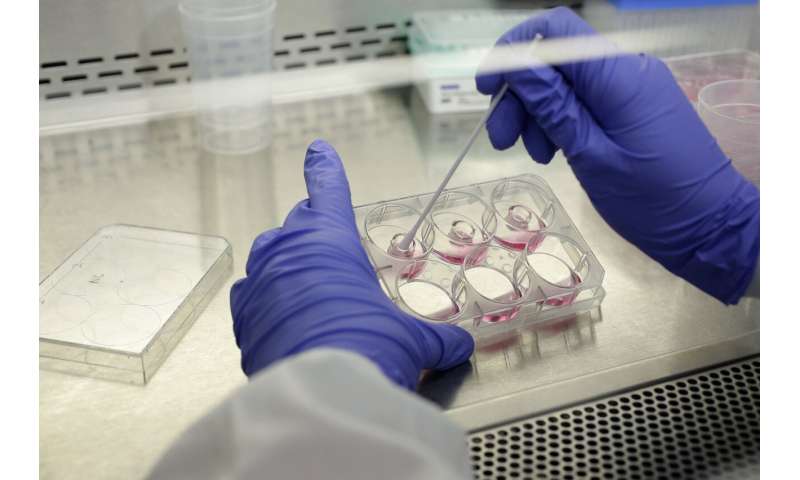
In this Wednesday, Jan. 15, 2020, photo scientist and study director Jennifer Molignano uses a swab to dry living human skin tissues after washing them with saline solution to remove a commercially available skin care product, during a demonstration of an experiment created to test the effects of skin care products on human skin tissue, in a lab at MatTek Corporation, in Ashland, Mass. (AP Photo/Steven Senne)
The Personal Care Products Council supports most of the state legislation but is pushing for a nationwide law instead of a patchwork of rules across the country.
Similar to the state laws, the proposed ban before Congress would exempt cosmetics required to undergo testing in China. It would allow those products to be sold in the U.S. as long as sellers relied on additional, non-animal tests to show they are safe.
California was first to pass the legislation in 2018, a move that's part of the state's pattern of wielding its status as the world's fifth-largest economy to push change.
"That's the beauty of doing things in California," said Judie Mancuso with the group Social Compassion in Legislation who pressed for that state's ban. "You set the stage, you set the standard, and others grab it and grow."
Explore further
California law banning sale of cosmetics tested on animals goes into effect January 1st
© 2020 The Associated Press. All rights reserved.
Citation:
US states join global push to ban animal-tested cosmetics (2020, February 1)
retrieved 1 February 2020
from https://phys.org/news/2020-02-states-global-animal-tested-cosmetics.html
This document is subject to copyright. Apart from any fair dealing for the purpose of private study or research, no
part may be reproduced without the written permission. The content is provided for information purposes only.
#Biology | https://sciencespies.com/biology/us-states-join-global-push-to-ban-animal-tested-cosmetics/
No comments:
Post a Comment